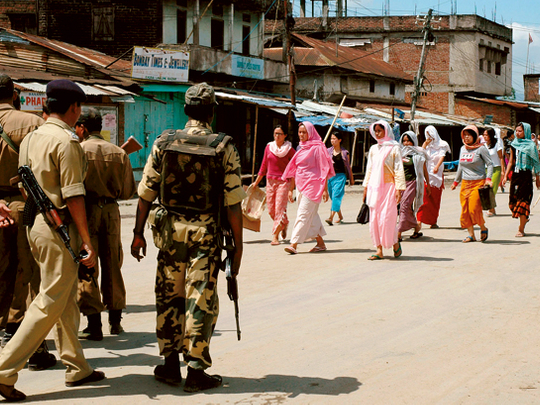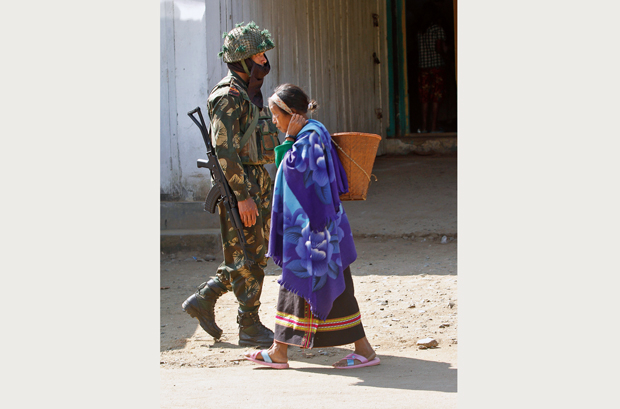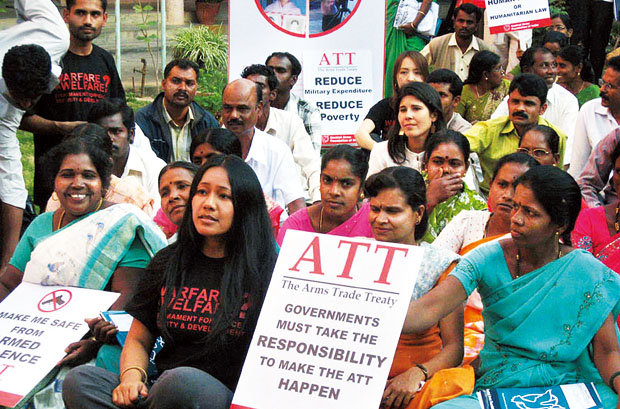
One moment Rebika Akham and a small group of people were huddled in a school discussing ways of tackling the violence dogging their state – Manipur in northeastern India. The next, three loud gunshots rang out as her husband was shot dead by rebels less than 50 metres away.
“It was such a shocking moment. I still have nightmares about it,’’ says Binalakshmi Nepram, an award-winning activist who was with Rebika’s group at the time of the tragedy. “We heard the gunshots, ran towards the source of the sound and saw Rebika’s husband, Buddhi Moinranthem, lying dead.” The 27-year-old had been shot through the chest, says Binalakshmi.
He had been dragged out of his car workshop and shot at point-blank range by an underground group of rebels who wrongly believed he was working for the government against them.
“I still remember his 24-year-old widow Rebika Akham being shell-shocked to see her husband dead,’’ says Binalakshmi. “While violence was not new to our village, this was the first time I had seen it first-hand.
“The fact that Rebika became a widow almost in front of my eyes affected me seriously. I wanted to do something to help her. But I knew if I really wanted to transform lives, this could only be a starting point.
“If we are to change situations like this, we have to ensure that the victims are never hungry, that they have some money to save for their future and to educate their children. This is the only way to transform society in the face of constant violence.”
The tools to earn
As well as comforting Rebika, Binalakshmi organised a collection drive and raised Rs4,500 (Dh280), with which she bought a sewing machine for the distraught widow.
Rebika had a daughter and knew how to sew, so with the machine she could earn a living to support her family.
Determined to do something for thousands of women like Rebika, Binalakshmi, 36, decided to set up a support system to help people affected by the violence to rebuild their lives. The result is the Manipur Women Gun Survivors Network (MWGSN), a charity that helps the families of those killed by the violence in Manipur.
Insurgency and militant activity erupted in Manipur after India became independent in 1947. A princely state at the time, Manipur was invited to join India, and while the majority of people were in favour, some groups wanted to remain separate and independent.
Once the state became part of India, the groups launched large-scale insurgency operations to destabilise it which, according to some reports, have claimed the lives of over 20,000 people including police and military personnel in the past six decades.
The Indian government’s move to deploy a large number of armed forces to tackle the issue has also led to anger among some people who feel their voice is being suppressed. Even today dozens of battalions of the Indian Army and several units of Indian paramilitary forces are in the state tackling insurgents.
Beginning with just 25 women, in December 2004, just days after Rebika’s husband was killed, Binalakshmi set up MWGSN, which was formally registered as a charity in 2007. Today the organisation has 150 members and reaches out to more than 1,000 women in Manipur who have in some way been affected by the violence.
“What we do is provide immediate help to women who have been deprived of a bread-winner. We offer them help with their children’s education and a source of earning for their daily needs as well as security as best as we can,’’ says Binalakshmi.
Help on a larger scale
Binalakshmi is also the secretary general of the Control Arms Foundation of India, an organisation that addresses issues relating to the use of force as well as the proliferation of small arms weapons. She organises campaigns for this cause across the world.
Her group in Manipur also provides legal assistance to the women to fight their cases for justice and compensation, since many can’t afford to hire lawyers.
Over the years Binalakshmi has received a clutch of awards on behalf of her organisation. Among them are the Humanitarian Initiative of the Year award in 2010, the Seán MacBride Peace Prize for outstanding work for peace, disarmament and human rights in 2010 and the CNN IBN Indian of the year in 2011.
MWGSN, which runs on donations, has transformed the lives of many people whose families have suffered at the hands of the violence. One person they helped is Huidrom Tanya Devi. She was just eight years old when she lost her father, a karate instructor, who was found shot dead by rebels in 2007.
The young girl still questions her father’s untimely death. “Even today I don’t know why my father died. I ask everyone but nobody has answers,” she says.
The network gave her mother a loan of Rs3,000, with which she was able to start a small grocery business. Over time, Huidrom Tanya and her mother became confident entrepreneurs and now their shop, which sells embroidered dress materials, incense sticks, fruit and vegetables, is running well and earning them a living.
Mumtaz is another victim whose husband, a college lecturer, was shot dead in 2009. With five children to look after, she too started a grocery business with a loan of Rs8,000 from MWGSN.
“Today’s gun violence has more to do with local, national and global politics than the separatist movement it started with,” says Binalakshmi.
She is trying to raise the profile of the people of northeast India and, in the process, create a force of global ambassadors who will speak about Manipur and its problems. Her aim is to disarm the rebels and encourage them to find a peaceful end to the conflict.
“We can only reach a limited number of women, but the government can connect with thousands of them. With this organisation we are showing the way, believing that someday things will change for the better.”
Tell us the story…
Do you know of an individual, a group of people, a company or an organisation
that is striving to make this world a better place? Email us at friday@gulfnews.com or the features editor at araj@gulfnews.com




